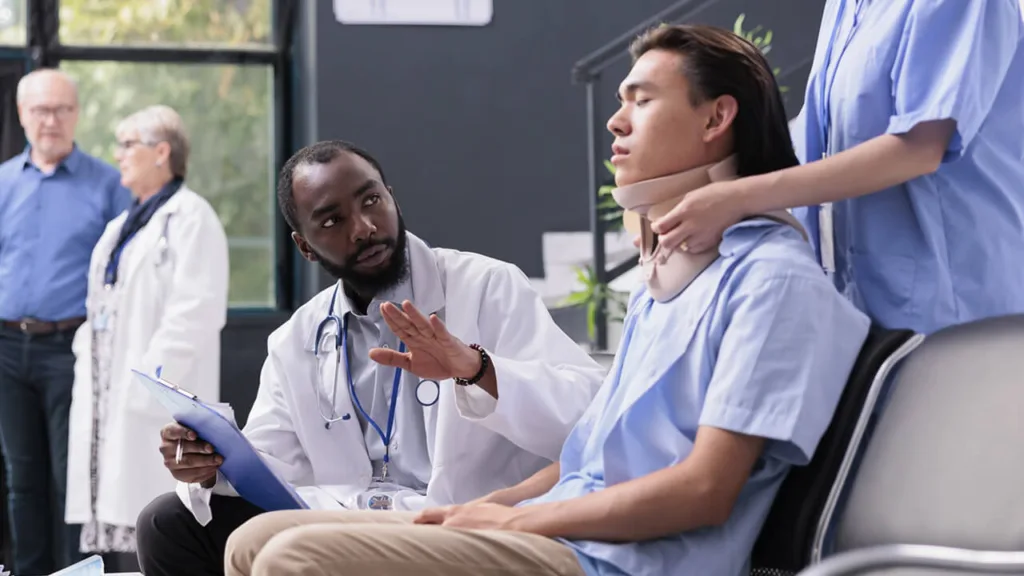5 Public Health Essentials Every Immigrant Must Know

Everyone, especially immigrants who are new to the United States, should understand the basics of public health. Everyone — including undocumented immigrants — has rights.
First things first, what is public health? Public health is the science and practice of protecting and improving the health of people and their communities. It focuses on preventing diseases, prolonging life, and promoting health through organized efforts, policies, education, and research at the population level—not just individual care.
Knowing your rights and the resources available to you can make a big difference for your well-being and your family’s. If you believe you have a case, consider getting professional legal advice to protect yourself. Our legal team is ready to help.
Here, we explain five key things every immigrant should know about accessing medical services, assistance programs, and legal protections:
1. Emergency Medical Treatment
In the United States, everyone has the right to receive emergency medical care at hospitals that receive federal funding, regardless of immigration status. This is protected under the Emergency Medical Treatment and Labor Act (EMTALA), which requires hospitals to stabilize any patient in critical condition—even if they don’t have insurance or can’t pay.
However, it’s important to understand that hospitals are not obligated to provide ongoing care once the patient is stable. For instance, if you suffer a heart attack, the hospital must treat you immediately. But if you need heart surgery afterward, you may need insurance or proof of ability to pay.
Undocumented immigrants are not eligible for federal programs like Medicaid or Medicare, except in life-threatening emergencies. In those cases, they may qualify for Emergency Medicaid, provided they meet the income requirements.
If a public or federally funded hospital refuses to treat you during an emergency, you have the right to file a complaint. Denying emergency medical care is considered a public health violation.
Don’t let fear over your immigration status keep you from getting the care you need. If you’re unsure about what rights apply to your situation, schedule a consultation with experienced attorneys.
Also, when traveling or settling in a new city or state, it’s a good idea to research and list nearby hospitals where you can go in case of an emergency.
2. Medical Care After a Workplace Accident
All workers in the United States, regardless of immigration status, have the right to a safe work environment. The Occupational Safety and Health Administration (OSHA) requires employers to follow safety standards to prevent accidents and to take responsibility for workers’ medical expenses in the event of a workplace injury.
What Must Your Employer Provide?
- Protective gear (helmets, gloves, harnesses for construction work)
- Safety training (how to operate machinery, prevent falls)
- Basic sanitary conditions (clean restrooms, drinking water)
- Protection from known hazards (chemical exposure, electrical risks)
If your employer doesn’t follow these regulations, you can file an anonymous complaint with OSHA.
Your Rights After a Workplace Injury
If you’re injured on the job, in most cases you have the right to:
- Receive immediate medical care after the accident
- Have your employer report the injury to the insurance company
- Be compensated for medical expenses (hospital visits, surgeries, therapy)
- Receive a portion of your wages if you’re temporarily unable to work
For example, if a janitor slips on a wet floor and breaks their arm, the employer must:
- Take them to the hospital
- Report the injury to the workers’ compensation insurance
- Cover their treatment and part of their wages during recovery
What Is Workers’ Compensation Insurance?
Workers’ Compensation is insurance that, by law, almost all employers are required to carry to ensure that injured workers receive benefits such as:
- Medical expenses (doctor visits, surgeries, medications)
- Lost wages (typically two-thirds of your regular pay if you can’t return to work after a few days)
- Permanent disability compensation (if you’re left with a lifelong injury)
- Vocational rehabilitation (if you need to switch jobs)
What If the Employer Doesn’t Have Insurance or Denies Responsibility?
If the employer doesn’t carry workers’ compensation insurance, the worker can:
- File a civil lawsuit directly against the employer to seek compensation
- Report them to the state’s Department of Labor
- Consult a workers’ compensation attorney to help negotiate a settlement or file a lawsuit
If the employer claims, “You didn’t work for me,” you can still take legal action. With the help of a legal team, you can prove you were employed by a company or individual using evidence such as:
- Pay stubs (even if paid in cash)
- Text messages or emails about work schedules
- Witnesses (like coworkers)
By showing that the injured worker was indeed employed by the person or company denying the relationship, the court may award compensation for medical costs and other damages.
If a third party—someone other than your employer—caused the accident, a legal team can help you sue for medical expenses and other damages. In some cases, injured workers may receive significant compensation, depending on the circumstances and applicable laws. Outcomes vary case by case.
Why Don’t Many Workers Claim Their Rights?
Out of fear of deportation, many immigrants don’t assert their workplace rights. However, civil and labor courts do not share information with immigration authorities.
Some employers have even threatened immigrant workers—this is illegal. If this happens to you, you can report the employer and may be protected under a federal program, because:
- Workers’ compensation is a right, not a favor
- No employer can fire you for reporting a workplace injury
- An attorney may be able to help you with no upfront cost (they only get paid if they win your case)
3. Dreamers and Federal Health Programs
DACA recipients (Deferred Action for Childhood Arrivals), also known as Dreamers, now have new opportunities to access health insurance. Starting in November 2024, they can enroll in Affordable Care Act (ACA) insurance marketplaces and in state health programs for low-income individuals.
It’s estimated that 100,000 previously uninsured Dreamers will gain access to medical coverage through this policy. This is especially significant, as many young immigrants delay medical treatment due to lack of resources.
If you’re a DACA recipient, you might be eligible for benefits you aren’t aware of. You may also have a legal pathway to obtain lawful status and protect yourself from deportation. Consult an immigration law team to explore your legal options and rights.
4. Medicaid and CHIP for Legal Immigrants
Immigrants with legal status—such as permanent residents, refugees, or asylees—can access Medicaid and the Children’s Health Insurance Program (CHIP). However, many must wait five years after obtaining legal status before they can enroll.
There are exceptions:
- Refugees and asylees are not subject to the waiting period
- Some states waive the wait for pregnant women and children
- Victims of human trafficking and domestic violence may also qualify immediately
If your income is very low but you don’t qualify for Medicaid, you can look for coverage through the health insurance marketplace, where you may be eligible for discounts. Using Medicaid or CHIP does not affect your immigration process for residency or citizenship.
While not all immigrant women qualify for medical insurance or children’s health programs, federal law requires all hospitals receiving federal funds to provide care if a woman goes into labor. Hospitals are not required to provide continued care after the mother and baby are stabilized unless the patient qualifies for other coverage. If you or a loved one is pregnant, it’s very important to identify available resources and nearby hospitals in case of an emergency.
5. Community Clinics
Community clinics are health centers that offer low-cost or even free medical services, especially designed for people without health insurance or with limited resources. These clinics are a vital alternative for public health in underserved communities—including undocumented immigrants.
Key Features of Community Clinics
- Operate with federal and state funding, private donations, and volunteers
- Do not ask about immigration status
- Charge based on the patient’s ability to pay—sometimes as little as $0 to $50 per visit. It’s important to confirm costs ahead of time to avoid misunderstandings
- Provide confidential services
Types of Services Offered
These clinics provide a wide range of essential services:
- Primary Care
- General medical consultations
- Management of chronic conditions like diabetes and high blood pressure
- Basic physical exams
- Preventive care
- Women’s Health
- Gynecological exams
- Pap smears
- Basic prenatal care
- Family planning education
- Pediatric Care
- Child wellness checkups
- Vaccinations
- Treatment for common illnesses
- Basic Dental Services
- Dental cleanings
- Simple tooth extractions
- Treatment for dental pain
- Mental Health
- Basic psychological counseling
- Support for managing stress and anxiety
- Referrals to specialists when needed
Who Can Receive Care at These Clinics?
You don’t need a Social Security number, proof of legal residency, or a complete medical history to receive care at these clinics. They serve:
- People without health insurance
- Undocumented immigrants
- Low-income families
- People experiencing homelessness
- Agricultural workers
Benefits of Community Clinics
- Accessibility: Many have extended hours and are located in areas with large immigrant populations
- Multicultural Staff: Many employees speak Spanish and understand the needs of the Latino community
- Sliding Scale Fees: Costs are adjusted based on the patient’s income
- Integrated Services: Some clinics offer social assistance along with medical care
Limitations of Community Clinics
While they are an invaluable resource, it’s important to understand that:
- They are not hospitals and cannot treat serious emergencies
- There may be waiting lists for certain services
- Specialist availability is limited
- Prescription medications may come with additional costs
How to Find a Community Clinic Near You
Use the online search tool from the National Association of Free & Charitable Clinics to locate a clinic near you.
Another way to find affordable medical care is by dialing 211 from any phone to get information on local services. You can also check with your state or local department of public health.
Additionally, you can ask for information or referrals at community centers, churches, public schools, immigrant support organizations, and Latino-owned stores or businesses.
What to Bring to Your First Appointment
Lack of documentation should not stop you from receiving care. Many clinics have procedures for patients without ID. While requirements may vary, it’s helpful to bring:
- A photo ID, if you have one
- Proof of income, such as a pay stub or tax return
- A list of any medications you’re currently taking
- Your medical history, if available
Community clinics are a cornerstone of the U.S. public health service, especially for vulnerable populations. If you or someone you know needs medical care but doesn’t have insurance or financial resources, don’t hesitate to explore these options.
Your health matters, and there are ways to care for it—regardless of your immigration status or financial situation. These clinics exist to ensure that no one is left out of basic healthcare.
Health Is a Right
Public health issues affects us all, and as an immigrant, it’s essential to know your options. From emergency care to community clinics, there are resources available to protect your well-being. At Moumita Rahman—Immigration Attorneys, we’re committed to supporting the immigrant community. If you have questions about your immigration status, reach out to us—you may have pathways to access greater protections. Book a consultation to learn about your rights and options.



